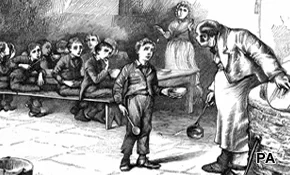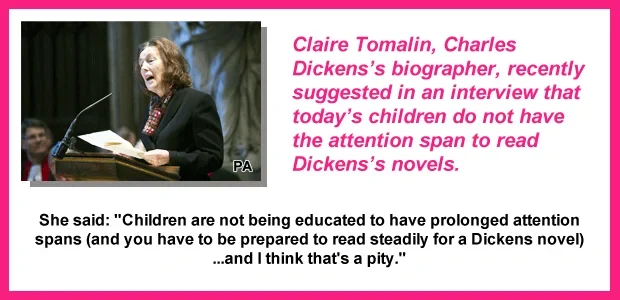This year marks writer Charles Dickens's bicentenary. But are his books still relevant?
And is the Internet changing the way we concentrate to the point where people today 'don't even have the necessary concentration span' to pick up a Dickens book?
We asked MediaLab participants and Dickens readers for their views
In case you haven’t heard, Charles Dickens turned 200 this year (in spirit, of course).
In the writer's honour, a calendar of round-the-world Dickens bicentenary celebrations has been coordinated by The Charles Dickens Museum, Dickens Fellowship and Film London, while fresh BBC adaptations and documentaries, theatre productions, major exhibitions and conventions continue to celebrate his many works worldwide.
It seems that, for his readers, never mind the London Olympics and the Queen’s Diamond Jubilee, 2012 will be well-and-truly Dickens’s year.
For many, Dickens’s book titles run off the tip of the tongue. From Oliver Twist, Bleak House and Hard Times, to The Pickwick Papers, Great Expectations and A Christmas Carol, the often-wry literary 19th century portraits inform, rightly or wrongly, our modern-day understanding of that period of history.
But do the Dickens readers that we asked in MediaLab still find the moralising tales of British society in the Victorian era relevant in 2012?
And do they agree with Claire Tomalin, Dickens’s biographer, that today’s children don’t have the attention spans needed to pick up a classic work, and read it to its conclusion?
YES, DICKENS’S PLOT LINES AND CHARACTERS ARE STILL RELEVANT TO MODERN SOCIETY

“Dickens wrote about every day subjects – love, hardship, struggle, family. If you read a book by Dickens you will be struck by how many parallels you can draw with life today” Shannon W, Aberdeen
“They highlight the different life chances of people from different socio-economic backgrounds” Tim, Northampton
“They show that revenge is not always sweet; that manners maketh the man; it is happier and less stressful for all when consideration is shown; to give a helping hand when needed, and loyalty to family, friends and country” Joyce, Bedfordshire
“They are part of the history of England. We should think how lucky we are that the conditions abounding in Dickens’ day have improved for the ordinary person” Barbara, Bridport

“Many of his themes are still directly applicable today. We have contemporary problems with bankers and government which are no different to those in, for instance, 'Our Mutual Friend'. Poverty and people who have fallen through society feature in many of his novels – as do so-called 'sink estates' –, e.g. Tom-All-Alones in Bleak House. Intractable mental health issues – Bradley Headstone in 'Our Mutual Friend' is a brilliant portrait of a man in the grip of OCD driven to insanity.
Prisons are still a major issue in society today and they feature frequently in his novels; children being groomed for a life in crime (Oliver Twist); drug abuse (The Mystery of Edwin Drood); school bullying by both teachers and other children (David Copperfield, Nicholas Nickleby)” Lesley H, London
“He wrote about humanity, compassion and morality in a world that could be grim, divided and cruel. These themes are still relevant despite the setting being a long time ago. We may not have workhouses, prison hulks and the poor laws today, but we have the attitudes that built them, and the contempt that sustained them” ED, Northampton
“Human nature does not change with changes in technology. The warmth, difficulties and darkness described by Dickens still exist as it always has” Antony B, Oxfordshire
“I think that they were less relevant for a while, but are becoming more relevant again, since the gap between rich and poor is widening once more due to the credit crunch and rising unemployment” Lesley, York
“He focuses on people and not a time or place, which is what makes him relevant today. His characters are fully-formed; they have a history and a story” Stacey, Northampton
NO, DICKENS’S WORKS REPRESENT ANOTHER AGE – THEY ARE NO LONGER APPLICABLE
“They are 200 years out of date” Mike A, Cornwall
“They are mildly interesting from the perspective of what was life like at the time they were written, but they reflect the values and concerns of a bygone age. I don't see much of relevance to 2012 because the values and challenges are different” Anon

“I studied Dickens and Shakespeare in school – put me off books for life” Peter E, UK
“His work is no longer ‘relevant’ in the sense that the society on which they commented has changed almost beyond recognition (and not always for the better). Even the archetypes represented by his characters are mostly extinct” Richard, Oxford
“Overwritten, too much misery, not anything to do with today” Rich, East Riding
“They were written so long ago in a completely different world and society. Whilst some themes are still relevant these themes are in Shakespeare, and will continue to be in all literature till the end of time. His overall theme of poverty however is not relevant to Britain” Robert, East Sussex
“He says a lot about man's inhumanity to man, the consequences of human greed, and the essentially unchanging nature of the human condition. But his heroines are mostly totally cardboard and bear little relationship to any woman who has ever existed” Anon
“They are not all relevant, and not all of the time. Dickens is someone whose work I see as an historical document, rather than a savaging of modern views. There are no workhouses, no orphanages with boys being sold, and no convicts shortly to be shipped to Australia, and so on. Dickens provides a good view into progressive social ideas in the nineteenth century, and is relevant in the same way that Benjamin Disraeli's novels, or Mayhew's 'London Labour and the London Poor', or John Snow's cholera map, or 'Self-Help' by Samuel Smiles are relevant.
The specific problems that they were commenting on have gone (although similar problems may still be present.) The value of Dickens, Disraeli, Snow and Smiles (and literally dozens if not hundreds more) lies in the fact that they felt the problems worthy of documentation, and did indeed document them” AW, Shropshire
Do children today lack the attention span needed to read Dickens?

In the next stage of our Dickens’ survey, we asked readers in our MediaLab whether they supported or opposed Tomalin’s stance.
1. Tomalin is right – Children today lack the attention span needed to read Dickens
Many agreed with Tomalin on this.
- Poor teaching, a lack of emphasis in schools on independent reading, and children not being stretched enough to read classic literature both in and out of the classroom, were regular responses.
- Another equally prominent line of argument was that, children in 2012, having grown up with ample access to the Internet and technology, go for 'instant gratification' in order to engage with what interests them.
- Many participants reasoned that because they primarily receive information in short bursts, children are only used to concentrating for short periods of time; are overwhelmed by choice, and are too easily distracted.

Andy from Worcester summarised the views of many that we received when he wrote:
“Modern experience tends to be broken up into bite-sized chunks: twelve minutes between advertisements; short songs with a less than extensive development of musical ideas; programmes broken up into short segments on a given subject (and if people have to be brought back to a subject after the ads, we get a recap because it is assumed we will have forgotten in the intervening 5 minutes).
Dickens is writing for an age when people have less urgent – and much less demanding – calls on their attention. He takes time out to describe people, places and events in some detail and assumes that his audience enjoys the writing for its own sake and is not in any particular hurry to get on with the plot.
As Claire Tomalin says, it's a pity, because the attention span of a goldfish (which is what many people seem now to have) is not good equipment for thinking well or understanding clearly. It risks wasting good minds if they never get applied to any one subject for any length of time.”
An anonymous 16-year-old agreed with this:
“I feel my attention span is too short. Imagine what younger kids' attention spans will be like if this trend has continued!"
2. Tomalin is wrong on this – Children today are just as capable as ever of reading Dickens
Many other participants completely disagreed, arguing that shifts in technology and access to media simply had nothing to do with it – and that there are as many avid young readers now as there ever were.
As 18-year-old Robert, from East Sussex, said:
“I first read Dickens when I was 14, and I am now 18, hence my view is slightly biased. Many people do not have the attention span to read Dickens, but that was the same 50 years ago, and even 100 years ago, no matter what their age. Many children do read Dickens, but many prefer to read modern books and read the classics later in life.”
Another older participant also disagreed with Tomalin’s perspective, remarking:
“If I’d had children's programmes on TV I'm sure I would have spent my time watching them rather than reading Dickens in bed – big books with lots of pages filled with tiny print and with the aid of a 20 watt lamp? We are all used to speedy gratification, not just children!
3. It's not about attention span - A child may just find Dickens's language ‘heavy going’

As these MediaLab participants explained:
“As a retired teacher, I know that the literacy strategy only allows for extracts from texts rather than allowing children to access the whole text. Actually, I think many children are well capable of sustained reading (e.g. the length of several Harry Potter novels) it is the language of Dickens that many of today's children find difficult” Anon
“Children need to be inspired not pandered to. Dickens’ works were originally sold as periodicals and were generally read to children rather than by children. Children have a much greater attention span for stories delivered in this way, but it is rare that children over the age of five hear stories in this form” Malcolm P, Somerset
Then, a number of participants questioned whether Dickens’s writing was even aimed at children at all.
“His books were not written for children, so the comment is a spurious one, anyway,” remarked Pollypenny, North Wales.
Moreover, adults are too quick to underestimate children – to the point of naivety, one ‘educator’ put.
And another teacher, in response to Tomalin’s viewpoint, said that while:
“…it may be true that technology and commercialism have changed the way in which we absorb information, I have seen no evidence that young people in general are less able to concentrate on novels, these days, than they were in the pre-Twitter, pre-internet days.”
All this said, there was a clear trend throughout the discussion of a need to encourage children to read more Dickens. But why, and how?
Q: How or why should we encourage people to read Dickens today?

“Unfortunately I fear that today's school generation are cut-off from the past (due to reliance upon computers and loss of literacy), but in moving with the times it ought to be possible to find a way to fit Dickens into the internet.
"The reading of Dickens's works should be encouraged alongside a proper social analysis, to enable the youth of today to understand how fortunate they are and foster a spirit of decency” Mike T, Shropshire
“Dickens’ stories have a moral to them, learning about good and bad, giving, greed, betrayal, heart and spirit. Kids today need to learn these qualities and the consequences and what better way than through a story?” Jane F, Warwickshire
“Humans, their contradictions and challenges don't change. We, also, need to continue to read the best of our language. It's not difficult if you are used to it. Everyone, no matter what their educational level, read or listened to Dickens in his day, so it's not beyond us today” Julie R, Wiltshire
“Perhaps a series of Dickens' novels published with covers designed for children would encourage young readers to pick up these books too” Anon

Which of Dickens’ works have you enjoyed? Perhaps you picked up a novel but found it didn’t appeal? Are Dickens’ plots and characters timeless, or no longer relevant?
Share your thoughts on Dickens at 200 in the Disqus comment below

Got something to add? Want to contribute to debates and discussions on the day's top news stories and issues? Follow @YouGovLabs on Twitter






